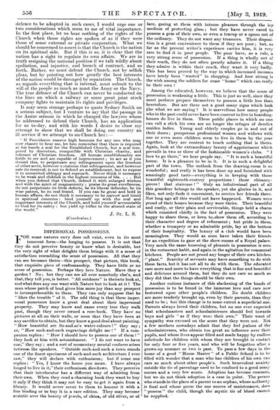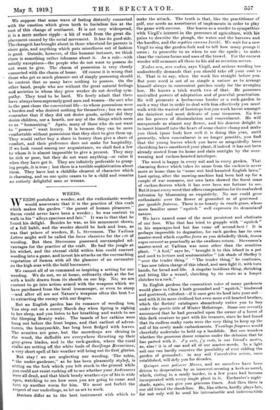IMPERSONAL POSSESSIONS.
['OR some natures envy does not exist, even in its most In innocent form—the longing to possess. It is not that they do not perceive beauty or know what is desirable, but the very sight of what delights them brings with it a sense of satisfaction resembling the sense of possession. All that they can see becomes theirs—this prospect, that picture, this book, that exquisite piece of craftsmanship. They have little or no sense of possession. Perhaps they love Nature. Have they a garden ? No ; but they can see all over somebody else's, and that, they tell you, is better. "All outdoors" is theirs to look at, and what does any one want with Nature but to look at it? The man whose patch of land gives him more joy than any prospect is incomprehensible to them. They can only suppose that he "likes the trouble" of it. The odd thing is that these imper- sonal possessors know a great deal about their impersonal property. They may know and name every tree they walk past, though they never owned a rose-bush. They have no pictures at all on their walls, or none that they have been at any sacrifice to obtain, but they know a good deal about painting. "How beautiful are So-and-so's water-colours !" they say ; or, " How such-and-such engravings delight me !" If a com- panion replies : How I should love to possess one of them ! " they look at him with astonishment. " I do not want to have one," they say ; and a sort of momentary mental coolness arises between the speakers. " Outside such-and-such a town stands one of the finest specimens of such-and-such architecture I ever saw," they will declare with enthusiasm; but if some one replies : " Yes, I know the house you mean. I have always longed to live in it," their enthusiasm diesdown. They perceive that their interlocutor has a different way of admiring from their own. When they read a charming book they want to buy it only if they think it may not be easy to get it again from a library. It would never occur to them to honour it with a fine binding or to buy it in a rare edition. They may become ecstatic over the beauty of jewels, of china, of old silver, or of lace, gazing at them with intense pleasure through the icy medium of protecting glass ; but they have never cared to possess a gem of their own, or even a teacup or a spoon out of the ordinary. They do not want any treasures. Their disposi- tion is a great convenience to them if they are poor ; but, so far as the present writer's experience carries him, it is very rare to find it in poor people. The poor have, as a rule, a very strong sense of possession. If a thing is wholly out of their reach, they do not often greatly admire it. If a thing they admire is within their reach, they want it very badly. This has been proved by the way in which increased incomes have lately been "wasted" in shopping. And how strong is the wish among the soldiers for some "home" which can really be their own !
Among the educated, however, we believe that the sense of possession is weakening a little. This is just as well, since they must perforce prepare themselves to possess a little less than heretofore. But are there not a good many signs which look like what we are saying ? It is marvellous how many people who in the past could never have been content to live in boarding- houses do live in them. These public places in which no one can call a stick his own are no longer the refugee of derelict maiden ladies. Young and elderly couples go in and out of their doors ; prosperous professional women and widows with one or even more children seem to live in them by the year together. They are content to touch nothing that is theirs. Again, look at the extraordinary luxury of appointment which prevails in two or three of the fashionable women's clubs. " I love to go there," we hear people say. " It is such a beautiful house. It is a pleasure to be in it. It is in such a delightful part of the town. The outlook from the drawing-room is so wonderful ; and really it has been done up and furnished with amazingly good taste—everything is in keeping with those beautiful eighteenth-century proportions ! those chimney. pieces ! that staircase ! " Only an infinitesimal part of all this grandeur belongs to the speaker, yet she glories in it, and likes, not only finds it convenient, to receive her friends there. Not long ago all this would not have happened. Women were proud of their homes because they were theirs. Their beautiful and costly, or their plain and serviceable, things held a charm which consisted chiefly in the fact of possession. They were happy to share them, or keen to,show them off, according to their character and degree of refinement ; but pride in them. whether a trumpery or an admirable pride, lay at the bottom of their hospitality. The luxury of a club would have been meaningless. They would as soon have taken their friends for an expedition to gaze at the show-rooms of a Royal palace. Very much the same loosening of pleasuie in possession is seen in the restaurant habit, and again in the agitation for communal kitchens. People are not proud any longer of their own kitchen " plant." Scarcity of servants may have something to do with these facts, but it has not all to do with them. The educated care more and more to have everything that is fine and beautiful and delicious around them, but they do not care so much as they did that the things should be their own.
Another curious instance of this slackening of the bonds of possession is to be found in the immense love and care now bestowed upon other people's children. No doubt children are more tenderly brought up, even by their parents, than they used to be ; but this change is to some extent a superficial one. Parents always loved their children, but no one ever expected that schoolmasters and schoolmistresses should feel towards boys and girls as if they were their own." Their want of sympathy was excused on the score that they were not. Not a few mothers nowadays admit that they feel jealous of the schoolmistresses, who obtain too great an influence over their pupils, and whose lives appear filled and made happy by endless solicitude for children with whom they are brought in contact for only four or five years, and who will be forgotten after a grown-up summer or two is past. To pass a few days in the home of a good "House Master" of a Public School is to be filled with wonder that a man who has children of his own can care so much, about other peoples. Such benevolent anxiety outside the tie of parentage used to be confined to a good many nurses and a very few aunts. Adoption has become common, but we do not think adoption is a case in point. The person who stands in the place of a parent to an orphan, whose authority is final and whose purse the one source of maintenance, does " possess " the child, though the mystic tie of blood cannot be supplied. We suppose that some wave of feeling distantly connected with the emotion which gives birth to Socialism lies at the root of this change of sentiment. 'It is not very widespread, it is a mere surface ripple—a bit of wash from the great dis- placement caused by the social movement. It has its good side. The changeit has brought about in those who stand for parents is sheer gain, and anything which puts miserliness out of fashion is good. Outside, however, of this humane instance, we think there is something rather inhuman about it. As a rule—with saintly exceptions—the people who do not want to possess do not want to give. The charm of possession is very closely connected with the charm of home. Of course it is wrong that those who get so much pleasure out of simply possessing should be content that so many have nothing to possess. On the other hand, people who are without the great natural feelings and societies in whom they grow weaker do not develop sym- pathy. They tend to be hard. We freely admit that there have always beensupremelygood men and women—the sort who in the past chose the conventual life—to whom possessions were a burden and who desired nothing for themselves ; but we must remember that if they did not desire geode, neither did they desire children, nor a hearth, nor any of the things which seem to us " humanizing." Again, many of those who do not want to " possess " want luxury. It is because they can be more comfortable without possessions that they elect to give them up. They would rather buy a share in luxury than give a share of comfort, and their preference does not make for hospitality. If we look round among our acquaintance, we shall find a few to whom it is almost impossible to give a present. They may be rich or poor, but they do not want anything—or value it when they have got it. They are infinitely preferable to grasp- ing people, it is true ; but there is a terrible sophistication about them. They have lost a childlike element of character which is charming, and no one quite ceases to be a child and remains an entirely delightful man or woman.



































 Previous page
Previous page